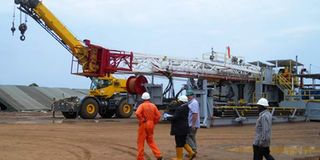Construction of Uganda’s oil refinery to start in 2015

Oil workers at Kigogole-5 oil well in Buliisa District. Countries like Iran and China have been pointed out as interested in the oil investment. PHOTO BY FRANCIS MUGERWA.
What you need to know:
The selected investor will own a 60 per cent stake in a partnership with government while other partner states are expected to buy 10 per cent of the stakes each.
Kampala
The government has started receiving bids from “appropriately qualified” investors to finance the country’s first Oil refinery complex whose construction is slated for 2015.
The 60,000 barrels-per-day refinery will be owned by the preferred investor/consortia in a [ratio] 60:40 Public-Private Partnership (PPP) with government, which called on other East African states to each buy a 10 per cent stake.
Commenting on the new development, the Energy ministry Permanent Secretary, Mr Kabagambe Kaliisa, said it marked, “the start of Uganda’s energy independence and will enhance the energy security by unleashing opportunity of our country’s rich oil resources, which some have described as the largest onshore oil discovery in Africa in the past 20 years.”
A landscape of 29 square kilometers in Kabaale Parish in Hoima District has already been secured to accommodate the $2.5 billion (Shs6 trillion) infrastructure, alongside an aerodrome, staff quarters, chemical treating plants, and other amenities like hospitals.
Mr Kaliisa added: “We are committed to a transparent process to develop Uganda’s first oil refinery.”
According to the Petroleum Exploration and Production Department (PEPD), the bidding firms are expected to submit their Statement of Qualification (SOQ) forms for the project within two months.
Development
The refinery will be developed in two phases, starting with 30,000 barrels-per day to allow oil production start in 2017 but another subsequent phase will be added by 2020. The government early this year contracted a US independent investment consultant, Taylor Dejongh, to offer transactional advice for the project and its financing. The consultant is also expected to review the SOQs, and manage the international competitive tenders, and advise on the appointment of the suitable consortium.
Any clue on the potential investors has been kept in the dark, but oil companies; UK’s Tullow Oil PLC and France’ Total (SA) currently undertaking oil exploration and are expected to provide the crude oil feedstock, distanced themselves from the project when contacted. Attempts to speak to the Chinese state owned, CNOOC were futile by press time, but the company has always expressed interest in helping government achieve the project reality.




